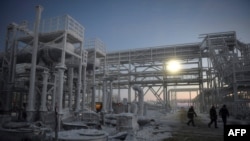The United States on Thursday imposed sweeping new measures against Moscow over the war in Ukraine, targeting Russia's future energy capabilities, sanctions evasion and a suicide drone that has been a menace to Ukrainian troops and equipment, among others, in sanctions on hundreds of people and entities.
The latest measures target a major entity involved in the development, operation and ownership of a massive project in Siberia known as Arctic-2 LNG, the State Department said in a statement. The project is expected to ship chilled natural gas, known as liquefied natural gas, to global markets.
Washington also targeted the KUB-BLA and Lancet suicide drones being used by the Russian military in Ukraine, designating a network it accused of procuring items in support of their production as well as the creator and designer of the drones.
The U.S. Department of Commerce on Thursday added 13 entities in Russia and Uzbekistan to its export control list for acting contrary to U.S. national security or foreign policy interests.
The U.S. also cracked down on sanctions evasion in the United Arab Emirates, Turkey and China, as the Treasury Department said companies based in the countries continue to send high priority dual-use goods to Russia, including components Moscow relies on for its weapons systems.
The Treasury Department also imposed sanctions on seven Russia-based banks and dozens of industrial firms, including Gazpromneft Catalytic Systems LLC, which Treasury said manufactures chemical agents for advanced oil refining in Russia.
The Kremlin said on Thursday ahead of the action that it expected the West to impose ever tougher sanctions on it over the war, but that there was a growing sense that such penalties hurt Western interests while Russia's economy was adapting well.
With the sanctions on limited liability company Arctic LNG 2, along with previous measures imposed on the project in September, the U.S. is trying to target Russia's upcoming energy production, similar to how it targeted its future deep-sea, shale and Arctic oil production after Moscow's invasion of Crimea in 2014. All of these hard-to-produce projects depend on Western technology.
The U.S., itself a large liquefied natural gas producer that exports to Europe, is also trying to reduce Russia's LNG shipments to Europe, which has only banned Russian gas sent via pipeline.
Arctic LNG 2 has been expecting to start exporting soon, and it is uncertain how much Russian LNG would be blocked by the new measures. The largest Russian LNG producer, Novatek NVTK.MM, said in September it would start shipments from Arctic LNG 2 early next year.
Thursday's action marks the first measures Washington has taken directly targeting the Lancet drone, an angular gray tube with two sets of four wings that has been an increasing threat on Ukraine's frontlines, according to Ukrainian solders.
Washington targeted limited liability company ZALA Aero, a Russia-based manufacturer the State Department said designs, manufactures and sells loitering munition and suicide drones to the Russian Ministry of Defense, as well as A Level Aerosystems CST, a Russia-based entity manufacturing and selling drones under the ZALA brand.
The owner of the companies, Aleksandr Zakharov, was also targeted, as were his wife, daughter and sons, and companies they own. The State Department said Zakharov is the creator and designer of the drones.
Washington has stepped up diplomatic pressure on countries and private companies globally to ensure enforcement of the barrage of sanctions it has unleashed on Moscow over its invasion of Ukraine.
Among those designated on Thursday were Turkish and UAE firms, including companies that sent high-priority goods to Russia and firms that have shipped aviation parts and equipment.
Three Chinese entities — two that the Treasury said have conducted hundreds of shipments of electro-optical equipment, cameras and other items, and one that has shipped radar components to Russia-based firms — were also targeted.
The State Department also imposed sanctions on multiple defense-related entities and procurement companies in the UAE.
Construction companies, Russian officials and a metals and mining company implementing a project to develop the largest titanium ore deposit in the world located in Russia were also hit with sanctions.





